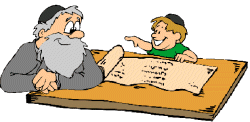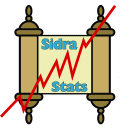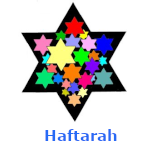Yithro
יִתְרוֹ
Exodus 18:1 – 20:23
Jethro’s Advice
Moses’ father-in-law, Jethro, sheik of Midian, heard about all that HaShem had done for Moses and His people Israel when He brought Israel out of Egypt. Jethro brought along Moses’ wife, Tzipporah, who had been sent home earlier, and her two sons.
The name of the first one was Gershom, because Moses had declared, “I was a foreigner (ger) in a strange land.” The name of the other one was Eliezer, because, “My father’s G-d (El) was my Helper (Ezer), rescuing me from Pharaoh’s sword.”
Jethro came together with Moses’ wife and sons to the desert, where Moses was staying, near HaShem’s mountain. He sent word to Moses: “I, your father-in-law Jethro, am on my way to you, along with your wife. Her two sons are with her.”
Moses went out to greet his father-in-law, bowing down low and kissing him. They asked about each other’s welfare and went into the tent. Moses told his father-in-law about all that HaShem had done to Pharaoh and Egypt for the sake of Israel, as well as all the frustrations they had encountered on the way, and how HaShem had rescued them. Jethro expressed joy because of all the good that HaShem had done for Israel, rescuing them from Egypt’s power. He said, “Praised be HaShem, who rescued you from the power of Egypt and Pharaoh – who liberated the people from Egypt’s power. Now I know that HaShem is the greatest of all deities. Through their very plots, He rose above them.” Jethro brought burnt offerings and other sacrifices to HaShem. Aaron and all the elders of Israel came to share the meal with Moses’ father-in-law before HaShem.
The next day, Moses sat to judge the people. They stood around Moses from morning to evening. When Moses’ father-in-law saw all that Moses was doing for the people, he said, “What are you doing to the people? Why are you sitting by yourself and letting all the people stand around you from morning until evening?”
“The people come to me to seek HaShem,” replied Moses to his father-in-law. “Whenever they have a problem, they come to me. I judge between man and his neighbor, and I teach HaShem’s decrees and laws.”
Moses’ father-in-law said to him, “What you are doing is not good. You are going to wear yourself out, along with this nation that is with you. Your responsibility is too great. You cannot do it all alone. Now listen to me. I will give you advice, and HaShem will be with you. You must be HaShem’s representative for the people, and bring their concerns to Him. Clarify the decrees and laws for the people. Show them the path they must take, and the things they must do. But you must also seek out from among all the people capable, G-d-fearing men – men of truth, who hate injustice. You must then appoint them over the people as leaders of thousands, leaders of hundreds, leaders of fifties, and leaders of tens. Let them administer justice for the people on a regular basis. Of course, they will have to bring every major case to you, but they can judge the minor cases by themselves. They will then share the burden, making things easier for you. If you agree to this, and HaShem agrees, you will be able to survive. This entire nation will then also be able to attain its goal of peace.”
Moses took his father-in-law’s advice, and did all that he said. He chose capable men from all Israel, and he appointed them as administrators over the people, leaders of thousands, leaders of hundreds, leaders of fifties, and leaders of tens. They administered justice on a regular basis, bringing the difficult cases to Moses, and judging the simple cases by themselves.
Moses let his father-in-law depart, and he went away to his homeland.
The Ten Commandments
In the third month after the Israelites left Egypt, on the first of the month, they came to the desert of Sinai. They had departed from Rephidim and had arrived in the Sinai Desert, camping in the wilderness. Israel camped opposite the mountain.
Moses went up to HaShem. HaShem called to him from the mountain and said, “This is what you must say to the family of Jacob and tell the Israelites: You saw what I did in Egypt, carrying you on eagles’ wings and bringing you to Me. Now if you obey Me and keep My covenant, you shall be My special treasure among all nations, even though all the world is Mine. You will be a kingdom of priests and a holy nation to Me. These are the words that you must relate to the Israelites.”
Moses came back and summoned the elders of the people, conveying to them all that HaShem had said. All the people answered as one and said, “All that HaShem has spoken, we will do.”
Moses brought the people’s reply back to HaShem. HaShem said to Moses, “I will come to you in a thick cloud, so that all the people will hear when I speak to you. They will then believe in you forever.”
Moses told HaShem the people’s response to that. HaShem said to Moses, “Go to the people, and sanctify them today and tomorrow. Let them even immerse their clothing. They will then be ready for the third day, for on the third day, HaShem will descend on Mount Sinai in the sight of all the people. Set a boundary for the people around the mountain, and tell them to be careful not to climb the mountain, or even to touch its edge. Anyone touching the mountain will be put to death. You will not have to lay a hand on him for he will be stoned or cast down. Neither man nor beast will be allowed to live. But when the trumpet is sounded with a long blast, they will then be allowed to climb the mountain.”
Moses went down from the mountain to the people. He sanctified them, and they immersed themselves and their clothing. Moses said to the people, “Keep yourselves in readiness for three days.”
The third day arrived. There was thunder and lightning in the morning, with a heavy cloud on the mountain, and an extremely loud blast of a ram’s horn. The people in the camp trembled. Moses led the people out of the camp toward the Divine Presence. They stood transfixed at the foot of the mountain.
Mount Sinai was all in smoke because of the Presence that had come down on it. HaShem was in the fire, and its smoke went up like the smoke of a lime kiln. The entire mountain trembled violently. There was the sound of a ram’s horn, increasing in volume to a great degree. Moses spoke, and HaShem replied with a Voice.
HaShem came down on Mount Sinai, to the peak of the mountain. He summoned Moses to the mountain peak, and Moses climbed up.
HaShem said to Moses, “Go back down and warn the people that they must not cross the boundary in order to see the Divine, because this will cause many to die. The priests, who usually come near the Divine must also sanctify themselves, or else I will send destruction among them.”
Moses replied to HaShem, “The people cannot climb Mount Sinai. You already warned them to set a boundary around the mountain and to declare it sacred.”
HaShem said to him, “Go down. You can then come back up along with Aaron. But the priests and the [other] people must not violate the boundary to go up to the Divine; if they do, He will send destruction among them.” Moses went down to the people and conveyed this to them.
The First Two Commandments
HaShem spoke all these words, saying:
I am HaShem your Lord, who brought you out of Egypt, from the place of slavery. Do not have any other g-ds before Me. Do not represent G-d by any carved statue or picture of anything in the heaven above, on the earth below, or in the water below the land. Do not bow down to or worship them. I am HaShem your Lord, a HaShem who demands exclusive worship. Where My enemies are concerned, I keep in mind the sin of the fathers for their descendants, to the third and fourth generation. But for those who love Me and keep My commandments, I show love for thousands of generations.
The Third Commandment
Do not take the name of HaShem your Lord in vain. HaShem will not allow the one who takes His name in vain to go unpunished.
The Fourth Commandment
Remember the Sabbath to keep it holy. You can work during the six weekdays and do all your tasks. But Saturday is the Sabbath to HaShem your Lord. Do not do anything that constitutes work. This includes you, your son, your daughter, your slave, your maid, your animal, and the foreigner in your gates. It was during the six weekdays that I made the heaven, the earth, the sea, and all that is in them, but he rested on Saturday. I therefore blessed the Sabbath day and made it holy.
The Fifth Commandment
Honor your father and mother. You will then live long on the land that HaShem your Lord is giving you.
The Sixth, Seventh, Eighth, and Ninth Commandments
Do not commit murder. Do not commit adultery. Do not steal. Do not testify as a false witness against your neighbor.
The Tenth Commandment
Do not be envious of your neighbor’s house. Do not be envious of your neighbor’s wife, his slave, his maid, his ox, his donkey, or anything else that is your neighbor’s
Aftermath of the Ten Commandments
All the people saw the sounds, the flames, the blast of the ram’s horn, and the mountain smoking. The people trembled when they saw it, keeping their distance.
They said to Moses, “You speak to us, and we will listen. But let HaShem not speak with us any more, for we will die if He does.”
“Do not be afraid,” replied Moses to the people. “HaShem only came to raise you up. His fear will then be on your faces, and you will not sin.”
The people kept their distance while Moses entered the mist where the Divine was revealed.
Concluding Rules
HaShem said to Moses: This is what you must tell the Israelites: “You have seen that I spoke to you from heaven. Do not make a representation of anything that is with Me. Do not make silver or gold g-ds for yourselves. Make an earthen altar for Me. You can sacrifice your burnt offerings, your peace offerings, your sheep and your cattle on it. Wherever I allow My name to be mentioned, I will come to you and bless you. When you eventually build a stone altar for Me, do not build it out of cut stone. Your sword will have been lifted against it, you will have profaned it. Do not climb up to My altar with steps, so that your nakedness not be revealed on it.”
Haftarah Connection

Isaiah 6.1-7.6, 9.5-6
This week’s Parsha the people of Israel receive the Torah and become a holy nation.
In the Haftara, When Isaiah has a vision of HaShem on his throne and the whole world is filled with his holiness. When the pillars start to shake he realizes that the Jewish people are not living as a holy nation as HaShem intended.
Sidra Stats

- Seventeenth of 54 Sedras in the Torah
- Written on — lines in the Sefer Torah
- 75 P’sukim (verses)
- 1,105 words
- 4,022 letters
Next week’s Parashat: Mishpatim


